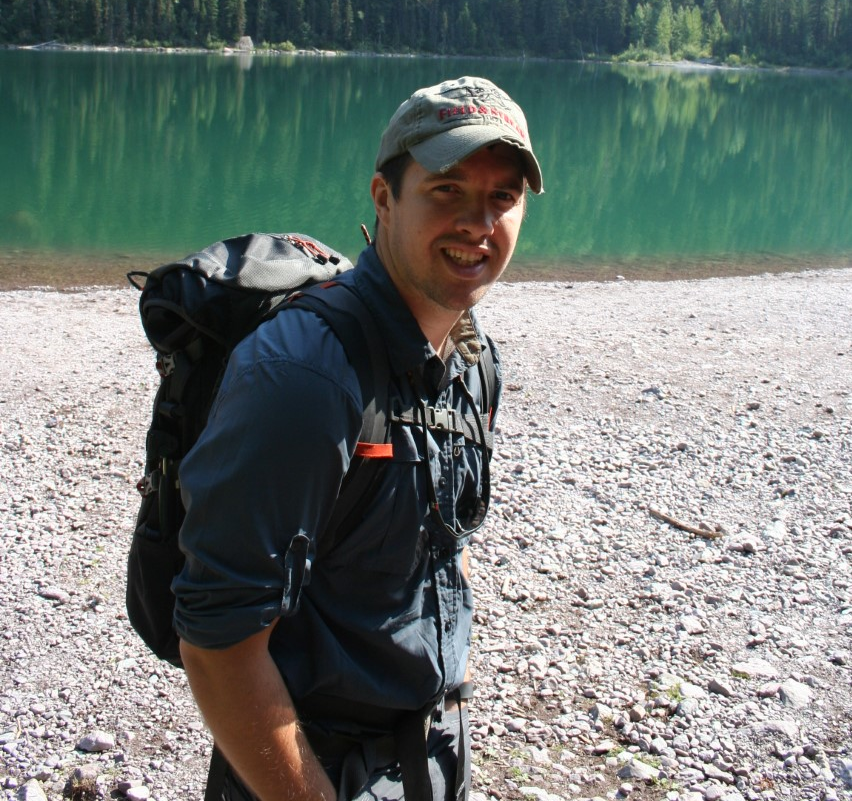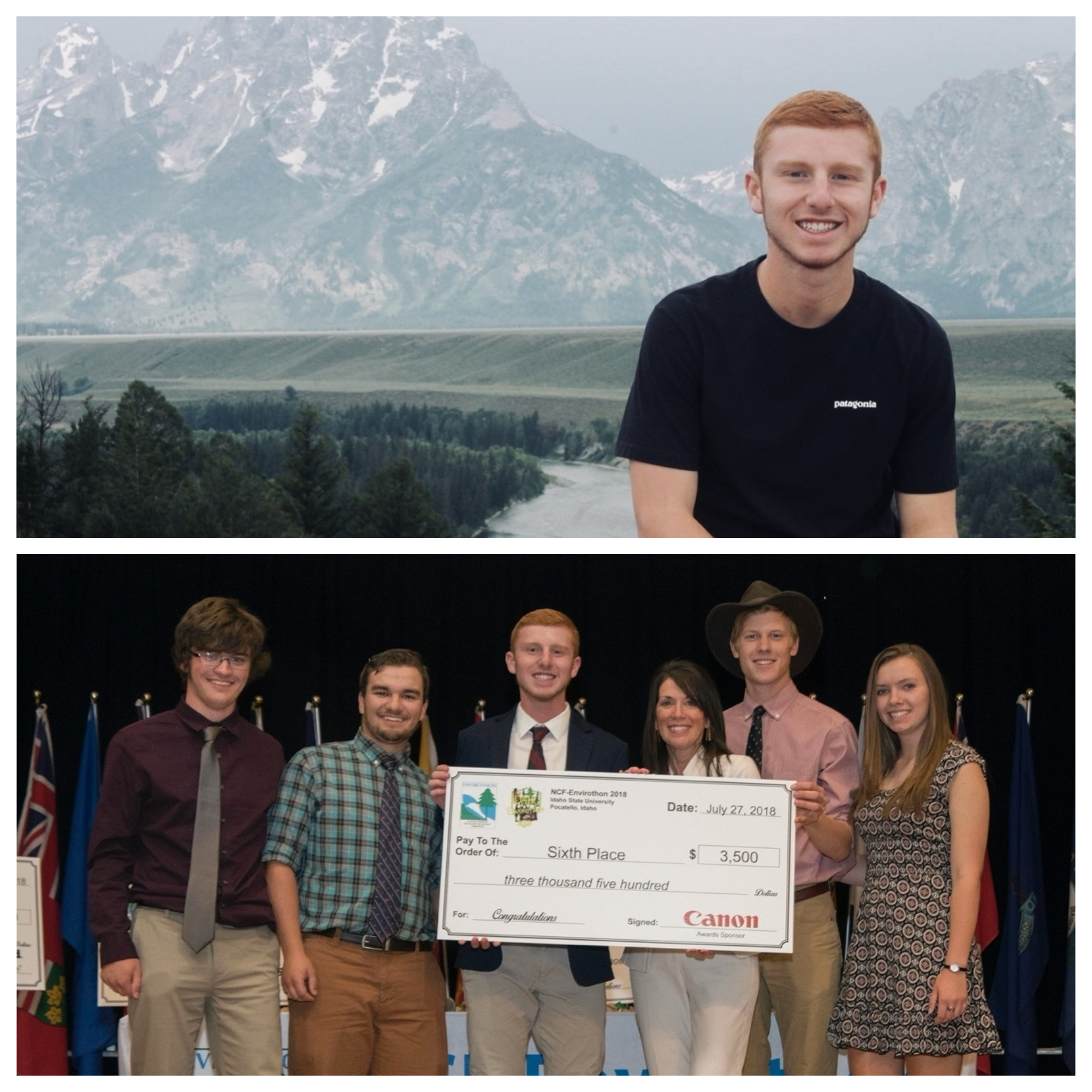Since 1979, hundreds of thousands of students have participated in the Envirothon. Alumni can be found across the world, with many going on to successful careers in the environment and/or natural resources. These alumni are today’s forest rangers, climate change scientists, biologists, conservationists, soil scientists, and more – all thanks to the Envirothon.
Below are a few words from Envirothon alumni about their experience and where they are today!
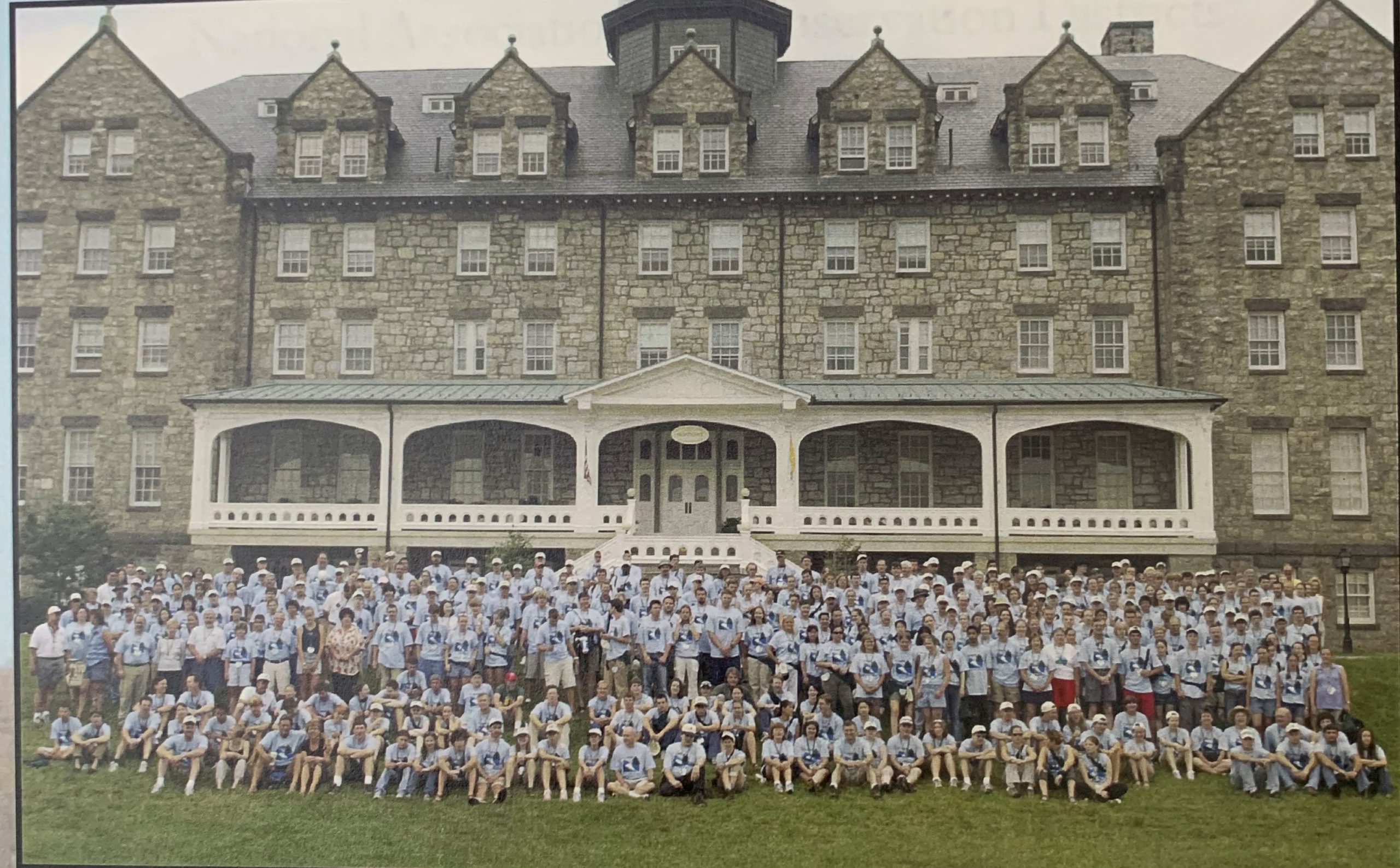
2003 National Envirothon Competition Group Photo - Maryland
We are always eager to hear from Envirothon alumni! Whether you competed at a local or international level, are in an environmental or natural resource-related field of work or not, we would love to hear about what the Envirothon meant to you.
Fill out this Envirothon Alumni Contact Form to sign up for updates and upcoming initiatives.
If Envirothon has made an impact on you, we would love to hear your Envirothon Alumni Story. Submit your story today and then connect with us on social media!
Envirothon Alumni Stories
Read below about the experiences and impressions that Envirothon left these alumni with.
(Click the next to their short bio to open each testimonial!)
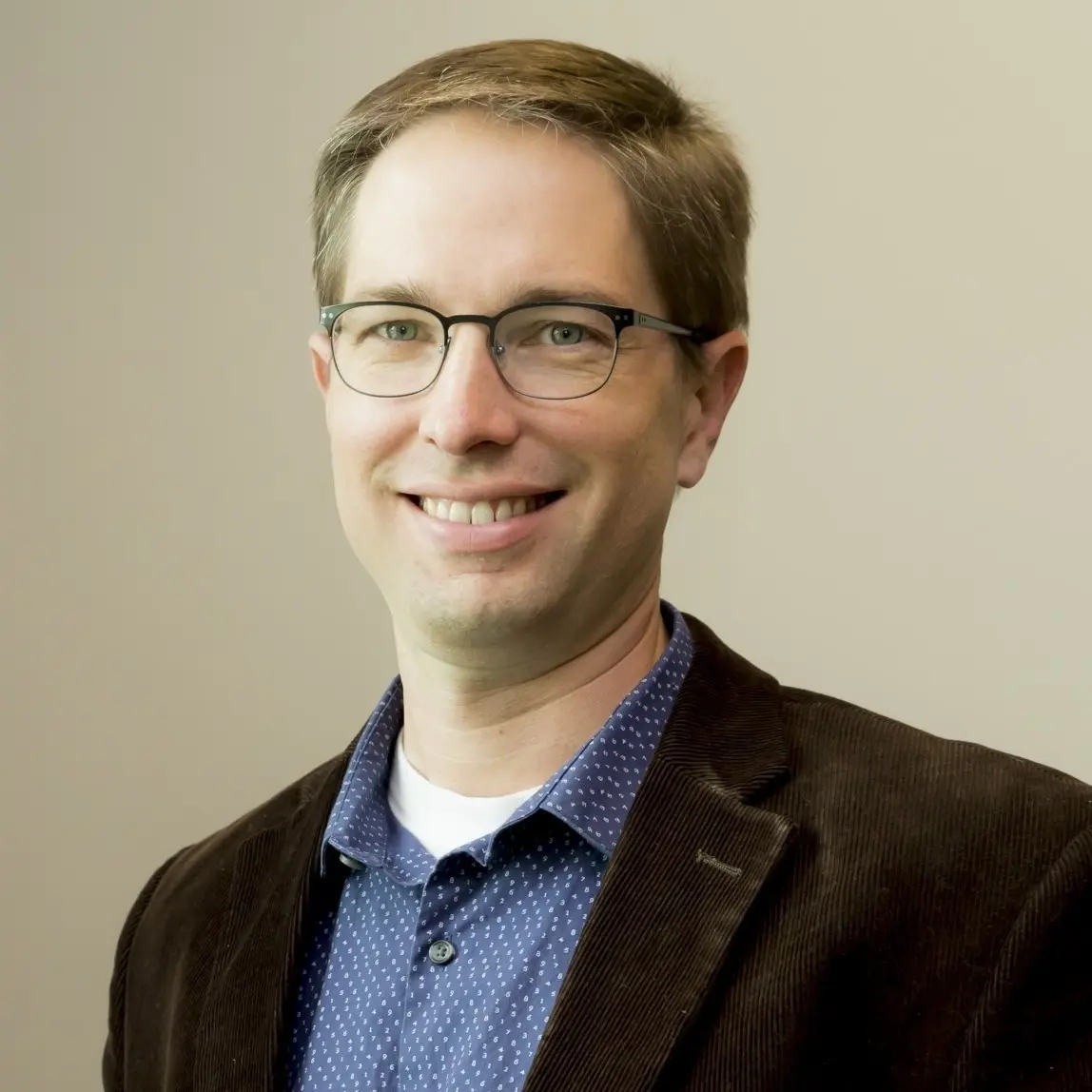
Martin Heintzelman: Pennsylvania Envirothon
Martin Heintzelman, is the Department Chair and Professor of the Department of Applied Economics and Statistics at the University of Delaware. As a high school student, Dr. Heintzelman was an Envirothon competitor and considers the Envirothon competition as one of the most important experiences of his life. (click here to read his story)
The NCF-Envirothon competition was one of the most important experiences of my life. I made lifelong memories, learned skills that still provide value 25 years later, and discovered topical interests that have steered my career. My three years of high school Envirothon culminated with a trip to the national competition in Asheville, North Carolina in 1994. In addition to the usual topical competitions on wildlife, aquatics, soils, forests, and current events (acid rain), we visited Mount Mitchell to see the damage of trail erosion, acid rain, and invasive insects firsthand. With those experiences fresh in our minds, we were tasked to devise and present a strategic plan to combat those challenges as if we were forest managers. Five of us worked all night on that presentation — five people that would go on to become economists, an aerospace engineer, a physicist and risk analyst, and a meteorologist. The competition was my first experience with collaborative, interdisciplinary work. I’ve been doing interdisciplinary work ever since!
We won that competition, presenting in front of expert judges and our fellow competitors, in what was exhilarating, stressful and, in the end, a huge boost of confidence for me as I prepared to head off to college. I distinctly remember flying home afterwards, sitting on an airplane with my good friend, and discussing our future careers. I said to him, “I have to find a way to use all that I have learned in Envirothon as I prepare to study economics. I wonder if there is anything called environmental economics.” With that seed planted, I headed off to college. In my very first semester I learned that, indeed, there was such a field. I began tailoring my course of study to focus on preparing for an environmental economics career.
I am very lucky to have been able to pursue that career. Today, I am now a professor of environmental economics at the University of Delaware. Environmental economics applies economic principles and models to environmental problems. Environmental economists seek to understand environmental pollution and over-exploitation of natural resources. We target appropriate goals for environmental quality that balance benefits and costs. We measure (and what are) the social values of environmental quality. And we design environmental policy to achieve environmental goals at least cost and maximum net benefit.
My own work at UD focuses on valuing environmental amenities and the positive and negative social impacts of energy infrastructure. I’ve researched everything from valuing lake water quality to ecosystem integrity to the impact of wind turbines and the value of microgrids for providing power to emergency services. I also study community decision-making regarding open space preservation and rules around fracking.
What is most exciting about this field is how we, as environmental economists, see our work applied in policymaking. For instance, environmental economics is used every day as policymakers consider the social cost of carbon. What are the social damages caused by an additional ton of atmospheric CO2? In turn, the social cost of carbon is a key input to models to help determine policy actions to reduce climate change.
Our work also helps design policies like the Clean Air Act, which greatly reduced acid rain from 1994, when it was the current event at the National Envirothon, to today, and at low cost relatively to the benefits of the program. Environmental economists also contribute locally to land use decisions, conservation programs, and legal cases determining damages from environmental accidents.
Environmental economics is an exciting field where you get to apply the economic logic and statistical techniques to solve real-world environmental problems and form policy solutions. Our field values and requires an interdisciplinary mindset — the very thing that the Envirothon competition works to promote in its participants.
We won that competition, presenting in front of expert judges and our fellow competitors, in what was exhilarating, stressful and, in the end, a huge boost of confidence for me as I prepared to head off to college. I distinctly remember flying home afterwards, sitting on an airplane with my good friend, and discussing our future careers. I said to him, “I have to find a way to use all that I have learned in Envirothon as I prepare to study economics. I wonder if there is anything called environmental economics.” With that seed planted, I headed off to college. In my very first semester I learned that, indeed, there was such a field. I began tailoring my course of study to focus on preparing for an environmental economics career.
I am very lucky to have been able to pursue that career. Today, I am now a professor of environmental economics at the University of Delaware. Environmental economics applies economic principles and models to environmental problems. Environmental economists seek to understand environmental pollution and over-exploitation of natural resources. We target appropriate goals for environmental quality that balance benefits and costs. We measure (and what are) the social values of environmental quality. And we design environmental policy to achieve environmental goals at least cost and maximum net benefit.
My own work at UD focuses on valuing environmental amenities and the positive and negative social impacts of energy infrastructure. I’ve researched everything from valuing lake water quality to ecosystem integrity to the impact of wind turbines and the value of microgrids for providing power to emergency services. I also study community decision-making regarding open space preservation and rules around fracking.
What is most exciting about this field is how we, as environmental economists, see our work applied in policymaking. For instance, environmental economics is used every day as policymakers consider the social cost of carbon. What are the social damages caused by an additional ton of atmospheric CO2? In turn, the social cost of carbon is a key input to models to help determine policy actions to reduce climate change.
Our work also helps design policies like the Clean Air Act, which greatly reduced acid rain from 1994, when it was the current event at the National Envirothon, to today, and at low cost relatively to the benefits of the program. Environmental economists also contribute locally to land use decisions, conservation programs, and legal cases determining damages from environmental accidents.
Environmental economics is an exciting field where you get to apply the economic logic and statistical techniques to solve real-world environmental problems and form policy solutions. Our field values and requires an interdisciplinary mindset — the very thing that the Envirothon competition works to promote in its participants.
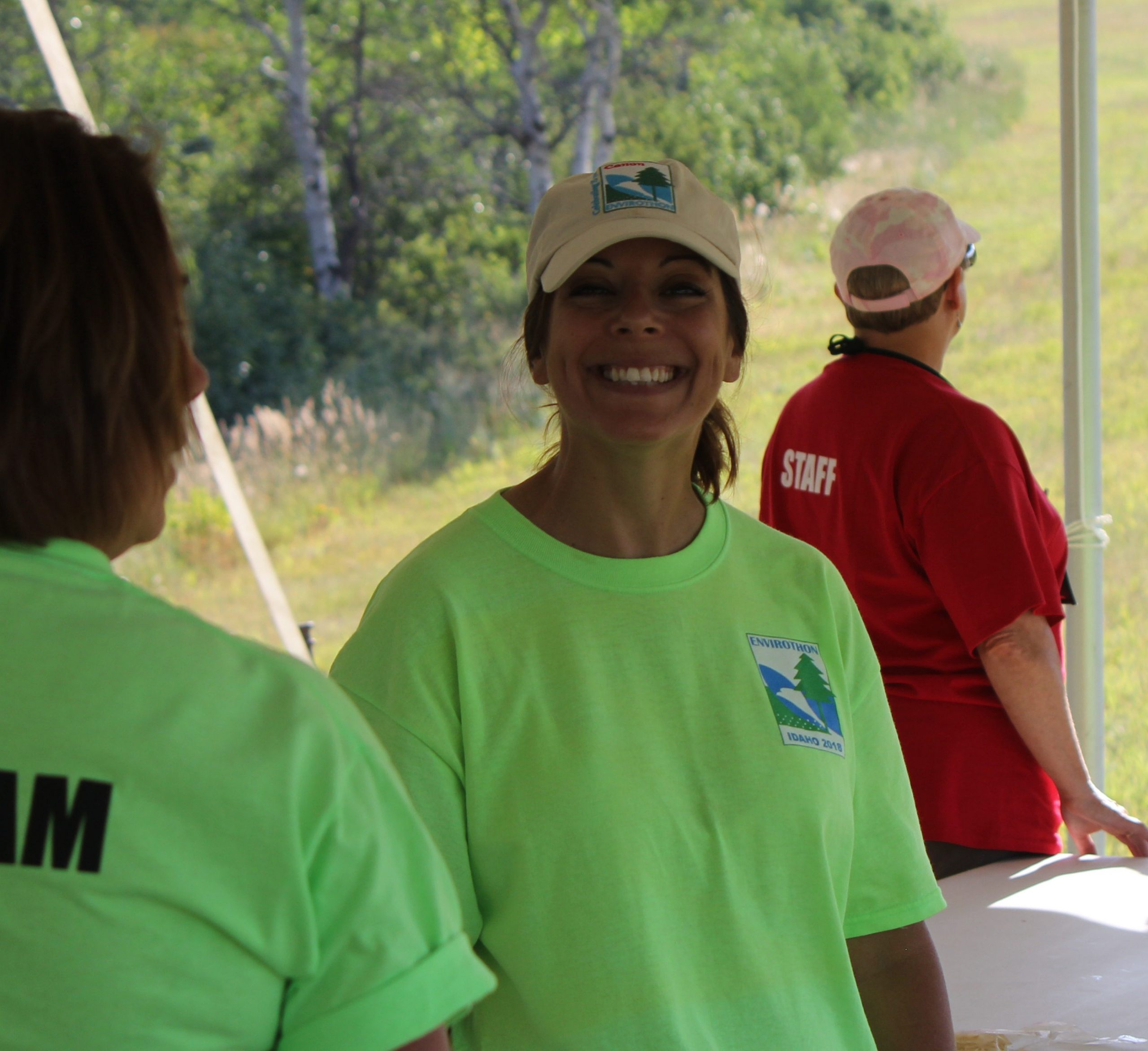
Wendee Dodds: Ohio Envirothon
Wendee Dodds is the Natural Resources Specialist for the Jefferson Soil and Water Conservation District in Jefferson County, Ohio. Her role involves providing conservation technical assistance and educational programming for her District, including working with a new generation of Envirothon students. (click here to read her story)
Dodds is an Envirothon champion, both locally and internationally, and currently serves as the chair of the Ohio Envirothon state committee, the vice-chair of the NCF-Envirothon Operating Committee, and the chair of the 2022 NCF-Envirothon Ohio annual international competition, which will be hosted by Ohio in July 2022.
What led you to your current career? I have been drawn to the outdoors since childhood. I had a fully stocked bug-box by five years old. In middle school, my family nicknamed me ‘Frog Lady’ because I was the kid looking at every rock, log, or puddle for signs of life. I could often be spotted face down on a dock looking through the cracks between the wood boards watching the fish underneath. Through most of my high school years, I ridiculed the idea that a boy could be more interesting than any of the things I could find outside.
As much as I loved the outdoors, I just couldn’t see how it could translate into something that I could make a living doing. But two things happened during my senior year of high school that helped everything fall into place – a high school outdoor class and teacher that strengthened my passion for conservation and the outdoors, and the Envirothon, an experience that truly opened my eyes about the diversity of not only natural resources but also career opportunities.
What University did you attended after high school? Degrees earned? Did your past Envirothon trainings help you in your college studies and if so, in what way? I attended Kent State University and earned a Bachelor of Science degree in Conservation. My Envirothon experience helped me to realize that I wasn’t just interested in one specific category of natural resources – I was interested in all of them. As it turned out, this was the exact focus of the Conservation degree, which covered all facets of natural resources, including wildlife management, local flora, soils, geology, climatology, and more. I looked forward to scheduling my classes every year, because there was so much opportunity to learn about the things that I loved.
About your experience Our team’s advisor was a kind person, but she was a music teacher and not extremely engaged in the Envirothon. My team, on the other hand, had love enough of learning about natural resources that we worked on what we could, using a box of information from teams that had competed in years before us. We placed somewhere in the middle of the pack at our area competition, which is what I think makes the potential for Envirothon’s impact on youth even more pronounced. Just that one short experience could change everything.
Another interesting note is that I now work for the District that facilitated my high school’s Envirothon program. Several years out of college, I was hired to do conservation technical work, which is still the main focus of my job. However, our District’s Administrator, Irene Moore, knew my love of the Envirothon and has always supported my hope to stay engaged with it. Throughout my conservation career, her leadership and passion for conservation and the Envirothon program have been something I have tried to follow in the example of.
How did your involvement in the Envirothon influence your career goals? It helped the idea of making a career out of doing something I loved actually materialize. It sounds very naïve, especially with the way that students have resources at their fingertips now, but when I first joined the team, the only outdoor career I could even visualize was being a Wildlife or Watercraft Officer, which wasn’t something I really wanted to do. The Envirothon helped me realize the diverse career potential out there in both the public and private sectors.
Why is education essential in conservation? Education, particularly hands-on education, in conservation is essential because it offers young people the opportunity to get outside and learn factual information about the natural resources issues of our time. Education in conservation connects science-based classroom learning and real-world application, which helps students form a more comprehensive picture of today’s natural resources and their significance. Conservation education provides youth the opportunity to learn from a diverse set of professionals and other land stewards researching and working in the field across a wide range of natural settings.
What do you think today’s students gain from participating in Envirothon? One of the great things about Envirothon is that the concepts and material the students are learning are always relevant. Participants learn how to be valuable members of a team, problem solve, and engage in cooperative decision making. They gain a greater awareness of natural resources and environmental issues and are exposed to various points of view on those environmental issues, while also learning about a diversity of career opportunities. Added benefits for students participating in today’s Envirothon are the unlimited resources available at their fingertips, numerous social media platforms and other means by way of which they can educate others, and increased opportunities for them to contribute on a local level.
In your opinion, what is the impact of the Envirothon program? Today’s youth will very soon be adults working in and making decisions about the world we live in. The Envirothon might actually be the foundation for some of the next generation of conservation leaders, as it was in my case. But even if these students aren’t all headed for a career in natural resources, if they instead become accountants, or surgeons, or legislators, they will forever be changed by their Envirothon experience. They will share their knowledge of how cover crops reduce soil erosion while riding past crop field in the backseat of a car with their parents on a rainy day. They will explain why those “weeds” in the pasture are so important to ecosystems. They will see the world around them instead of just riding past it.
Why should individuals support the NCF-Envirothon? If you ever have a chance to interact with students on Envirothon teams or see the kinds of ideas and solutions they present in their oral presentations during the competition, you really do feel your heart swell with pride. It makes you look forward with excitement at what they might accomplish in their adult lives. By supporting the NCF-Envirothon, we can all positively impact the future of our natural resources.
What led you to your current career? I have been drawn to the outdoors since childhood. I had a fully stocked bug-box by five years old. In middle school, my family nicknamed me ‘Frog Lady’ because I was the kid looking at every rock, log, or puddle for signs of life. I could often be spotted face down on a dock looking through the cracks between the wood boards watching the fish underneath. Through most of my high school years, I ridiculed the idea that a boy could be more interesting than any of the things I could find outside.
As much as I loved the outdoors, I just couldn’t see how it could translate into something that I could make a living doing. But two things happened during my senior year of high school that helped everything fall into place – a high school outdoor class and teacher that strengthened my passion for conservation and the outdoors, and the Envirothon, an experience that truly opened my eyes about the diversity of not only natural resources but also career opportunities.
What University did you attended after high school? Degrees earned? Did your past Envirothon trainings help you in your college studies and if so, in what way? I attended Kent State University and earned a Bachelor of Science degree in Conservation. My Envirothon experience helped me to realize that I wasn’t just interested in one specific category of natural resources – I was interested in all of them. As it turned out, this was the exact focus of the Conservation degree, which covered all facets of natural resources, including wildlife management, local flora, soils, geology, climatology, and more. I looked forward to scheduling my classes every year, because there was so much opportunity to learn about the things that I loved.
About your experience Our team’s advisor was a kind person, but she was a music teacher and not extremely engaged in the Envirothon. My team, on the other hand, had love enough of learning about natural resources that we worked on what we could, using a box of information from teams that had competed in years before us. We placed somewhere in the middle of the pack at our area competition, which is what I think makes the potential for Envirothon’s impact on youth even more pronounced. Just that one short experience could change everything.
Another interesting note is that I now work for the District that facilitated my high school’s Envirothon program. Several years out of college, I was hired to do conservation technical work, which is still the main focus of my job. However, our District’s Administrator, Irene Moore, knew my love of the Envirothon and has always supported my hope to stay engaged with it. Throughout my conservation career, her leadership and passion for conservation and the Envirothon program have been something I have tried to follow in the example of.
How did your involvement in the Envirothon influence your career goals? It helped the idea of making a career out of doing something I loved actually materialize. It sounds very naïve, especially with the way that students have resources at their fingertips now, but when I first joined the team, the only outdoor career I could even visualize was being a Wildlife or Watercraft Officer, which wasn’t something I really wanted to do. The Envirothon helped me realize the diverse career potential out there in both the public and private sectors.
Why is education essential in conservation? Education, particularly hands-on education, in conservation is essential because it offers young people the opportunity to get outside and learn factual information about the natural resources issues of our time. Education in conservation connects science-based classroom learning and real-world application, which helps students form a more comprehensive picture of today’s natural resources and their significance. Conservation education provides youth the opportunity to learn from a diverse set of professionals and other land stewards researching and working in the field across a wide range of natural settings.
What do you think today’s students gain from participating in Envirothon? One of the great things about Envirothon is that the concepts and material the students are learning are always relevant. Participants learn how to be valuable members of a team, problem solve, and engage in cooperative decision making. They gain a greater awareness of natural resources and environmental issues and are exposed to various points of view on those environmental issues, while also learning about a diversity of career opportunities. Added benefits for students participating in today’s Envirothon are the unlimited resources available at their fingertips, numerous social media platforms and other means by way of which they can educate others, and increased opportunities for them to contribute on a local level.
In your opinion, what is the impact of the Envirothon program? Today’s youth will very soon be adults working in and making decisions about the world we live in. The Envirothon might actually be the foundation for some of the next generation of conservation leaders, as it was in my case. But even if these students aren’t all headed for a career in natural resources, if they instead become accountants, or surgeons, or legislators, they will forever be changed by their Envirothon experience. They will share their knowledge of how cover crops reduce soil erosion while riding past crop field in the backseat of a car with their parents on a rainy day. They will explain why those “weeds” in the pasture are so important to ecosystems. They will see the world around them instead of just riding past it.
Why should individuals support the NCF-Envirothon? If you ever have a chance to interact with students on Envirothon teams or see the kinds of ideas and solutions they present in their oral presentations during the competition, you really do feel your heart swell with pride. It makes you look forward with excitement at what they might accomplish in their adult lives. By supporting the NCF-Envirothon, we can all positively impact the future of our natural resources.
Seth Harden: Indiana Envirothon
Seth Harden works as the Upper Wabash River Project Director for The Nature Conservancy. He attended Purdue University where he got a B.S. Forestry and has obtained a Masters of Public Affairs from the IUPUI Paul H. O’Neill School of Public and Environmental Affairs with a concentration Environmental Policy Analysis. (click here to read his story)
Growing up in a rural community and coming from agricultural roots, I have always had strong ties to land resources and stewardship. My parents instilled a passion for the outdoors through travel, camping, paddling, and hunting. Student organizations like 4-H, FFA, and Boy Scouts gave me the opportunity to informally study environmental science topics and experience the outdoors on a frequent basis. In fact, a group of rowdy country boys from central Indiana including myself, came together as an Envirothon team, due to our common involvement in 4-H. We would go on to be quite successful regionally and compete in the North American competition three times.
What was then Canon Envirothon, provided an opportunity for my teammates and I to experience the applied science of conservation. We had become well aware of the forestry and soils topics through other extracurricular activities, and we were quite confident in our ability to share the narrative of agriculture. That being said, the regional competitions pushed us to calibrate and deepen our knowledge of ecology and science. The state competition required critical thinking, interdisciplinary strategy, and concise communication. Eventually, the North American Envirothon competition took us out of our native “habitat” to Maryland, Missouri, and Manitoba. We were exposed to a whole new set of conservation issues and situations, while maintaining the common ecological themes. We matured as a team, developed life skills, and professional skills throughout. Exposure to conservation professionals from governmental agencies and NGOs at these competitions, who were doing real science outdoors and getting paid to do it, eventually led me to my academic focus and career trajectory. My teammates went into public service, farming, and agribusiness, and we see each other only occasionally. However, I can be sure that I can call upon any of them at any time for a favor or professional advice.
When you land in your dream job and get deep into the daily tasks, you often forget to reflect and consider just how fortunate you are. In the constant inertia of project management, I often take my role for granted. I have become one of those conservation professionals who does real science outdoors and get paid to do it. But, it is so much more. I lean upon the skills and training I learned in Envirothon daily. I also use my Envirothon experience as a proxy for when I engage with students in the field. I remember the energy of the competitions and the topics that widened the eyes of my teammates and peers from across the continent. I consider which members of my audience may just take their professional cue from what I say, demonstrate, or explain. I consider this a noble task and why I am passionate about the sustainability of the Envirothon competition and experience.
I can say with confidence, if it hadn’t been for the Envirothon competition, I wouldn’t be working for the The Nature Conservancy, the largest non-governmental environmental organization on Earth. I owe the Envirothon experience sincere lifelong appreciation and commitment.
What was then Canon Envirothon, provided an opportunity for my teammates and I to experience the applied science of conservation. We had become well aware of the forestry and soils topics through other extracurricular activities, and we were quite confident in our ability to share the narrative of agriculture. That being said, the regional competitions pushed us to calibrate and deepen our knowledge of ecology and science. The state competition required critical thinking, interdisciplinary strategy, and concise communication. Eventually, the North American Envirothon competition took us out of our native “habitat” to Maryland, Missouri, and Manitoba. We were exposed to a whole new set of conservation issues and situations, while maintaining the common ecological themes. We matured as a team, developed life skills, and professional skills throughout. Exposure to conservation professionals from governmental agencies and NGOs at these competitions, who were doing real science outdoors and getting paid to do it, eventually led me to my academic focus and career trajectory. My teammates went into public service, farming, and agribusiness, and we see each other only occasionally. However, I can be sure that I can call upon any of them at any time for a favor or professional advice.
When you land in your dream job and get deep into the daily tasks, you often forget to reflect and consider just how fortunate you are. In the constant inertia of project management, I often take my role for granted. I have become one of those conservation professionals who does real science outdoors and get paid to do it. But, it is so much more. I lean upon the skills and training I learned in Envirothon daily. I also use my Envirothon experience as a proxy for when I engage with students in the field. I remember the energy of the competitions and the topics that widened the eyes of my teammates and peers from across the continent. I consider which members of my audience may just take their professional cue from what I say, demonstrate, or explain. I consider this a noble task and why I am passionate about the sustainability of the Envirothon competition and experience.
I can say with confidence, if it hadn’t been for the Envirothon competition, I wouldn’t be working for the The Nature Conservancy, the largest non-governmental environmental organization on Earth. I owe the Envirothon experience sincere lifelong appreciation and commitment.
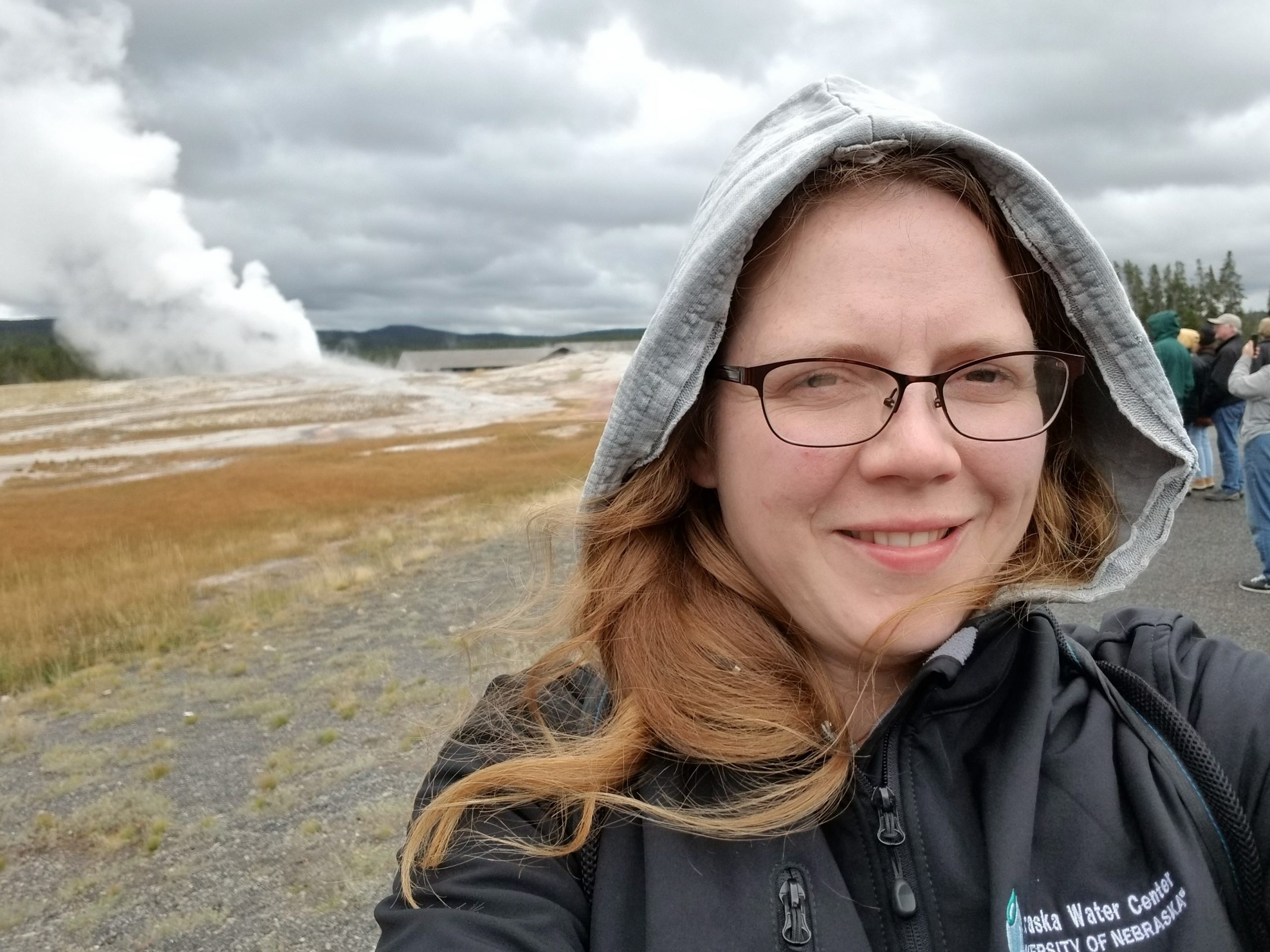
Crystal Powers: Nebraska Envirothon
Crystal Powers is the Research and Extension Communications Specialist for the Nebraska Water Center, Nebraska Extension, and Daugherty Water for Food Global Institute at the University of Nebraska. Her role includes communication and coordination between academic faculty and water managers across the state to address water, food, and natural resource challenges. (click here to read her story)
What inspired you to participate in the Envirothon program?
I enjoyed knowledge-based competitions and Envirothon also brought in hands-on skills in beautiful settings.
How did your involvement in Envirothon influence your career goals? Envirothon gave me the opportunity to see careers that involved conservation. I realized I too had a passion for helping people through caring for our natural environment and enjoyed telling others about it. I saw how agriculture and the nature can work together. I went on to major in environmental engineering focused on agroecology as well as communicating the science. In my career I have continued that same focus of bringing people together to tackle some of the world's wicked problems.
Are there any skills that you learned through Envirothon that you currently use? Being observant of nature. Communicating science. Researching problems. Working as a team.
Your Envirothon experience in your own words... As a freshmen and sophomore, it was a great contest to get outdoors and combine knowledge across several different environmental topics. We made it to state both years and loved the opportunity to travel to state parks I had never seen. By my junior year, we had a really great team and were getting good at preparing for the special topics and presentations. We qualified for the international competition and traveled to the amazing Redwood forests of California which continue to inspire me to this day. Our senior year we were back with a few new team members and again qualified for internationals which took us to Nova Scotia. The Bay of Fundy was amazing and the glimpse into an maritime province was a great cultural experience for this 'land lubber.' Envirothon combined several of my passions: curiosity, nature, agriculture, competition, and travel.
What do you think students gain from participating in Envirothon? Better understanding of nature and conservation, seeing of agriculture and conservation can work together, love of the outdoors, meeting people from all over who also care about the environment, seeing new career opportunities.
Why should today's students choose to pursue environmental ecology, natural resource conservation and/or agriculture as a field of study? These disciplines are critical for the future. The very foundation of our cultures is based on providing food and clean water while finding ways to conserve beauty and cultural value of our landscape. Yet we are facing huge environmental challenges around water, climate, biodiversity, food, and health. Students can be a part of solving these wicked problems! They can become leaders in serving their communities and finding regenerative solutions for a better tomorrow.
How did your involvement in Envirothon influence your career goals? Envirothon gave me the opportunity to see careers that involved conservation. I realized I too had a passion for helping people through caring for our natural environment and enjoyed telling others about it. I saw how agriculture and the nature can work together. I went on to major in environmental engineering focused on agroecology as well as communicating the science. In my career I have continued that same focus of bringing people together to tackle some of the world's wicked problems.
Are there any skills that you learned through Envirothon that you currently use? Being observant of nature. Communicating science. Researching problems. Working as a team.
Your Envirothon experience in your own words... As a freshmen and sophomore, it was a great contest to get outdoors and combine knowledge across several different environmental topics. We made it to state both years and loved the opportunity to travel to state parks I had never seen. By my junior year, we had a really great team and were getting good at preparing for the special topics and presentations. We qualified for the international competition and traveled to the amazing Redwood forests of California which continue to inspire me to this day. Our senior year we were back with a few new team members and again qualified for internationals which took us to Nova Scotia. The Bay of Fundy was amazing and the glimpse into an maritime province was a great cultural experience for this 'land lubber.' Envirothon combined several of my passions: curiosity, nature, agriculture, competition, and travel.
What do you think students gain from participating in Envirothon? Better understanding of nature and conservation, seeing of agriculture and conservation can work together, love of the outdoors, meeting people from all over who also care about the environment, seeing new career opportunities.
Why should today's students choose to pursue environmental ecology, natural resource conservation and/or agriculture as a field of study? These disciplines are critical for the future. The very foundation of our cultures is based on providing food and clean water while finding ways to conserve beauty and cultural value of our landscape. Yet we are facing huge environmental challenges around water, climate, biodiversity, food, and health. Students can be a part of solving these wicked problems! They can become leaders in serving their communities and finding regenerative solutions for a better tomorrow.
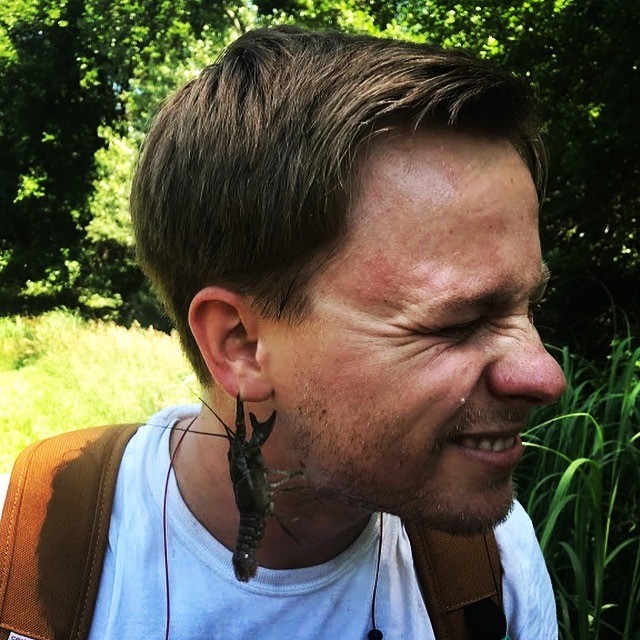
Austin Hill: Nebraska Envirothon
Austin Hill is the Education Programs Supervisor for the Papio-Missouri River Natural Resources District in Nebraska. As a high school student, Austin participated for two years in the local Envirothon program through his high school. (click here to read more)
What inspired you to participate in the Envirothon program?
I was fortunate to have a highly motivated teacher who encouraged his students to participate in as many science focused competitions and fairs as we can. It was a great opportunity to gauge our knowledge of the environment and how we stacked up to other schools in our region.
How did your involvement in Envirothon influence your career goals? I have always enjoyed getting outside and exploring the environment around me. Envirothon gave me an introduction into ways I can take that natural curiosity and intrigue, and utilize it for a career in one of the numerous environmental fields.
Are there any skills that you learned through Envirothon that you currently use? Skull I.D., secchi disk-water turbidity/quality, plant/animal I.D.
Your Envirothon experience in your own words... Growing up, I was lucky in that I had parents who gave me opportunities to free play and explore nature independently. I would wander out to the woods behind my house, make a tree fort, collect insects, and explore what I personally found interesting in nature. Fast forward to high school and those memories and experiences were great in shaping me but didn't have many opportunities to take that knowledge and put it to use. I took chemistry, biology, earth science... none delved into the specific topics I personally had an interested in. Having a competition like Envirothon, you can focus your attention on environmental issues and identification in your specific region, not tested on overarching scientific principles like what is common in high school education. It reinforced my interest and showed that this knowledge is applicable and inherently valuable.
What do you think students gain from participating in Envirothon? It gives students examples of some of the questions and issues professionals are trying to address and solve, usually with a tie to the local region. I think a lot of kids in high school think like I did when you mention environmental careers, you think Park Ranger. There are so many different jobs from diverse fields and the demand is only growing.
Why should today's students choose to pursue environmental ecology, natural resource conservation and/or agriculture as a field of study? I think humans are starting to wise up to the fact that our actions have and will continue to have a lasting impact on earth and the organisms it supports. Unfortunately, we are roughly 250 years late to the program, so we need to jumpstart career opportunities in the field to hopefully right the ship and minimize the lasting damage.
How did your involvement in Envirothon influence your career goals? I have always enjoyed getting outside and exploring the environment around me. Envirothon gave me an introduction into ways I can take that natural curiosity and intrigue, and utilize it for a career in one of the numerous environmental fields.
Are there any skills that you learned through Envirothon that you currently use? Skull I.D., secchi disk-water turbidity/quality, plant/animal I.D.
Your Envirothon experience in your own words... Growing up, I was lucky in that I had parents who gave me opportunities to free play and explore nature independently. I would wander out to the woods behind my house, make a tree fort, collect insects, and explore what I personally found interesting in nature. Fast forward to high school and those memories and experiences were great in shaping me but didn't have many opportunities to take that knowledge and put it to use. I took chemistry, biology, earth science... none delved into the specific topics I personally had an interested in. Having a competition like Envirothon, you can focus your attention on environmental issues and identification in your specific region, not tested on overarching scientific principles like what is common in high school education. It reinforced my interest and showed that this knowledge is applicable and inherently valuable.
What do you think students gain from participating in Envirothon? It gives students examples of some of the questions and issues professionals are trying to address and solve, usually with a tie to the local region. I think a lot of kids in high school think like I did when you mention environmental careers, you think Park Ranger. There are so many different jobs from diverse fields and the demand is only growing.
Why should today's students choose to pursue environmental ecology, natural resource conservation and/or agriculture as a field of study? I think humans are starting to wise up to the fact that our actions have and will continue to have a lasting impact on earth and the organisms it supports. Unfortunately, we are roughly 250 years late to the program, so we need to jumpstart career opportunities in the field to hopefully right the ship and minimize the lasting damage.
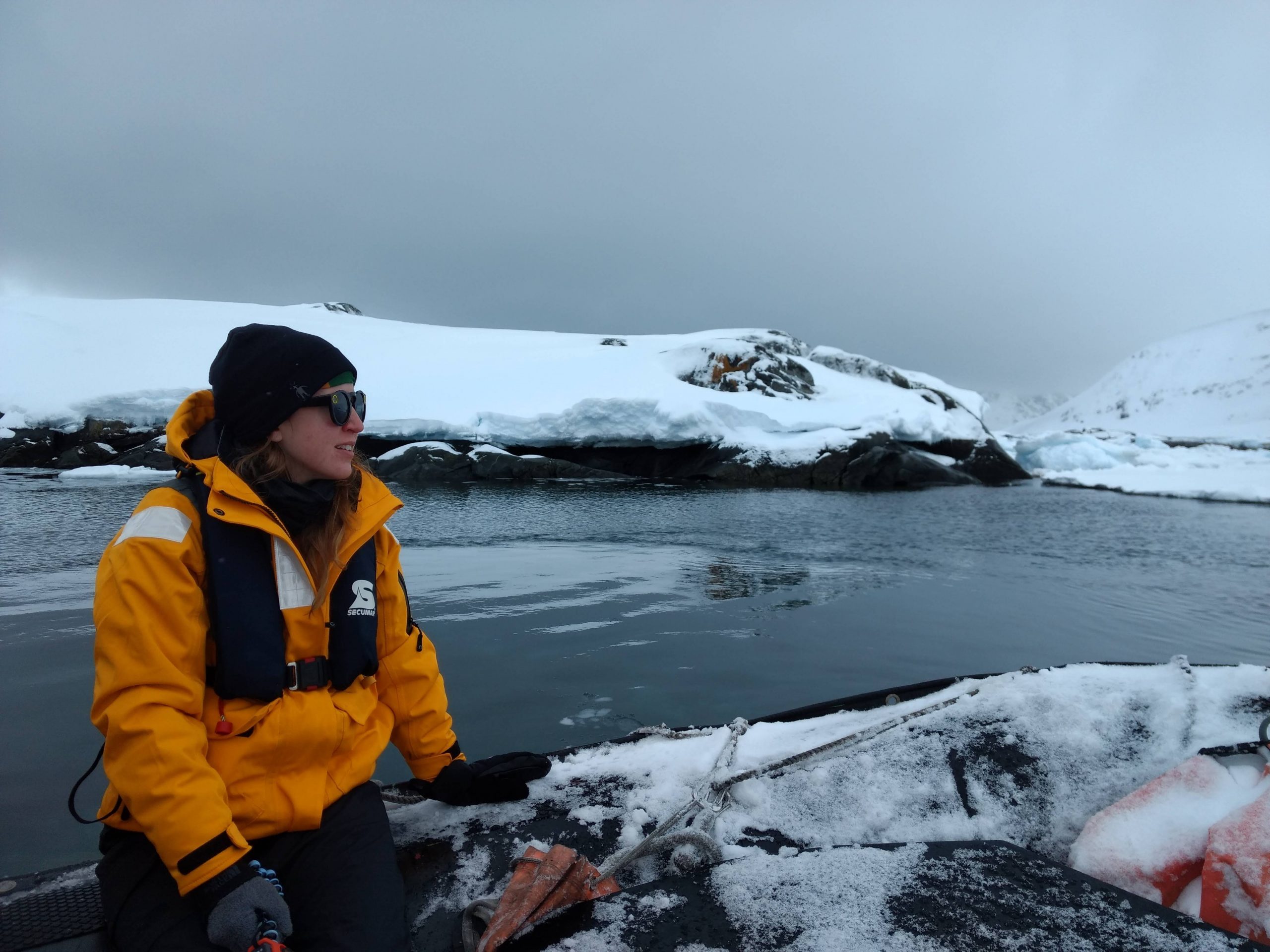
Dr. Emily Moberg: Pennsylvania Envirothon
Emily Moberg, PhD, is an Envirothon alumna and currently works at the World Wildlife Fund (WWF) in D.C. She also runs the National Network for Ocean and Climate Change Interpretation, an organization that seeks to educate U.S.-based informal and formal science educators on how to effectively communicate climate science to the American public. (click here to read more)
Moberg first became involved with Envirothon during her freshman year of high school and continued until she graduated. Her sophomore year team even won the national competition – something Moberg describes as her best moment of high school.
About her experience… Envirothon was the best experience of my high school career and set the stage for my future work; I also met some of my closest friends through Envirothon. This competition provided an introduction to ecology, highlighted the importance of environmental health for society, and challenged me to assimilate new knowledge quickly. I learned how to apply that information and present it to others. I pursued applied environmental science in my undergraduate studies of Environmental Engineering at MIT, and in my doctoral studies in Biological Oceanography at Woods Hole Oceanographic Institution (which is suspiciously similar to my Envirothon category--aquatic ecology!)
I now work as a Research Lead Specialist at the World Wildlife Fund on greenhouse gas impacts within agriculture. In this work, I often think about different types of ecosystems and how interventions will affect both the ecosystems and the people living and using the land. The science I learned from Envirothon is still useful to me everyday!
How did your involvement in the Envirothon program influence your career goals? Envirothon really opened my eyes to what environmental science is. It made me look at what types of careers are available in this field. For me, Envirothon highlighted the linkage between human well-being and the environment. My involvement in Envirothon and desire to work on real-world analogs of work I encountered in Envirothon – like the oral problem-solving piece of the competition (where you are given a real-world problem and asked how to approach it) – helped me decide to major in environmental engineering.
It also influenced my view of what teamwork looks like and how important collaboration is. I had the experience of working with others who had different expertise really early on. Spending a few hours working on a problem and then going out and giving a presentation about it was a wonderful experience.
Why is supporting NCF and the Envirothon program important to you? It is important to me because I think that Envirothon is one of the few avenues for younger students to learn about the environment – not just “go outside and look around you,” but in a really meaningful “what does environmental science actually mean and what does it influence” sort of way. Environmental science is not taught in most high schools, so organizations and competitions like Envirothon have stepped in to introduce students to this fundamentally critical topic.
I think Envirothon and NCF are filling a hole that our society fundamentally needs. I think it is such a wonderful opportunity for students to learn skills like teamwork, to be engaged in competition with people who are coming from different backgrounds and know fundamentally different things, and to go to different states to learn about what issues are important there. In addition, the competition also provides scholarships to students who are successful, helping them attend colleges and universities where they may choose to study these topics.
Why is it important for us to support the next generation of conservation leaders? For me, the most critical challenge is making sure the next generation knows that there are both careers and interesting topics in conservation. I think allowing students, who are the next generation of conservation leaders, to explore and experience a range of environmental topics is so important. Otherwise, they are going to end up doing amazing things in some other field, which is wonderful too, but I think giving them the option and letting them see themselves in conservation has not historically been prioritized. We need their voices. We need their talent. I think they also need our support in showing them a path and helping them get up to speed a little bit faster.
In your opinion, what is the impact of the NCF-Envirothon program? Envirothon is clearly impactful for students who participate, but it also impacts communities. With Envirothon, the way I started thinking influenced the way that my parents think. In the intervening years, they have changed the way that they grow grass – or not grass – in their yard. They have planted more native species. They have taken efforts to make sure that their yard is a great wildlife habitat, and then have loved seeing all of the species that now live there. The success of our program influenced attitudes about environmental science in our middle and high school as well.
Why should individuals support the NCF-Envirothon? Envirothon fills a niche that I think very few other programs do – it has students engage with these environmental topics in a way that is inherently interdisciplinary. It links human actions, topics like farming and climate change, with the environment in a way that is both substantial and also accessible for students.
Envirothon operates at local, state and international scales. There are a lot of people along the way who are developing competition resources and tests, who are running stations, and who are trying to make sure that students can get to these competitions. The infrastructure for competition is so well-run, and so many students participate. That does take money to happen, but the impact is definitely worth it.
About her experience… Envirothon was the best experience of my high school career and set the stage for my future work; I also met some of my closest friends through Envirothon. This competition provided an introduction to ecology, highlighted the importance of environmental health for society, and challenged me to assimilate new knowledge quickly. I learned how to apply that information and present it to others. I pursued applied environmental science in my undergraduate studies of Environmental Engineering at MIT, and in my doctoral studies in Biological Oceanography at Woods Hole Oceanographic Institution (which is suspiciously similar to my Envirothon category--aquatic ecology!)
I now work as a Research Lead Specialist at the World Wildlife Fund on greenhouse gas impacts within agriculture. In this work, I often think about different types of ecosystems and how interventions will affect both the ecosystems and the people living and using the land. The science I learned from Envirothon is still useful to me everyday!
How did your involvement in the Envirothon program influence your career goals? Envirothon really opened my eyes to what environmental science is. It made me look at what types of careers are available in this field. For me, Envirothon highlighted the linkage between human well-being and the environment. My involvement in Envirothon and desire to work on real-world analogs of work I encountered in Envirothon – like the oral problem-solving piece of the competition (where you are given a real-world problem and asked how to approach it) – helped me decide to major in environmental engineering.
It also influenced my view of what teamwork looks like and how important collaboration is. I had the experience of working with others who had different expertise really early on. Spending a few hours working on a problem and then going out and giving a presentation about it was a wonderful experience.
Why is supporting NCF and the Envirothon program important to you? It is important to me because I think that Envirothon is one of the few avenues for younger students to learn about the environment – not just “go outside and look around you,” but in a really meaningful “what does environmental science actually mean and what does it influence” sort of way. Environmental science is not taught in most high schools, so organizations and competitions like Envirothon have stepped in to introduce students to this fundamentally critical topic.
I think Envirothon and NCF are filling a hole that our society fundamentally needs. I think it is such a wonderful opportunity for students to learn skills like teamwork, to be engaged in competition with people who are coming from different backgrounds and know fundamentally different things, and to go to different states to learn about what issues are important there. In addition, the competition also provides scholarships to students who are successful, helping them attend colleges and universities where they may choose to study these topics.
Why is it important for us to support the next generation of conservation leaders? For me, the most critical challenge is making sure the next generation knows that there are both careers and interesting topics in conservation. I think allowing students, who are the next generation of conservation leaders, to explore and experience a range of environmental topics is so important. Otherwise, they are going to end up doing amazing things in some other field, which is wonderful too, but I think giving them the option and letting them see themselves in conservation has not historically been prioritized. We need their voices. We need their talent. I think they also need our support in showing them a path and helping them get up to speed a little bit faster.
In your opinion, what is the impact of the NCF-Envirothon program? Envirothon is clearly impactful for students who participate, but it also impacts communities. With Envirothon, the way I started thinking influenced the way that my parents think. In the intervening years, they have changed the way that they grow grass – or not grass – in their yard. They have planted more native species. They have taken efforts to make sure that their yard is a great wildlife habitat, and then have loved seeing all of the species that now live there. The success of our program influenced attitudes about environmental science in our middle and high school as well.
Why should individuals support the NCF-Envirothon? Envirothon fills a niche that I think very few other programs do – it has students engage with these environmental topics in a way that is inherently interdisciplinary. It links human actions, topics like farming and climate change, with the environment in a way that is both substantial and also accessible for students.
Envirothon operates at local, state and international scales. There are a lot of people along the way who are developing competition resources and tests, who are running stations, and who are trying to make sure that students can get to these competitions. The infrastructure for competition is so well-run, and so many students participate. That does take money to happen, but the impact is definitely worth it.

Frankie Lineberger: North Carolina Envirothon
Frankie Lineberger, is an Envirothon alumna and currently works with her husband (also an Envirothon alum) on their family’s farm in Gaston County, North Carolina. She first became involved with Envirothon in sixth grade and continued her involvement throughout the rest of her middle- and high-school years. (click here to read more)
How did your involvement in the Envirothon program influence your career goals?
I majored in natural resources in college. I think that was in large part due to Envirothon, because I was very interested in the material. As a part of that major, I got into the local food space, and I learned about how local food and local farming dovetail with a lot of environmental goals. It is something that is attainable and something that everyday people can do to help the environment. That is why, I think, this job appeals to me.
Why is supporting NCF and the Envirothon program important to you? Sustainability really influences every decision that I make on a daily basis. It influenced my career choices. It influences whether I use the dryer or hang my clothes out on the line to dry. It influences my choices about which products I buy, if they are local, and how they are packaged. It influences how much effort I make to recycle things, and how I cook at home to avoid Styrofoam takeout containers. There are so many little daily things that we can do to reduce our impact on the environment, but without a good understanding of what those things are and the impacts of your individual decisions, people don’t think through the consequences of their actions. If they had more education in this realm, they would understand more about the trade-offs.
Because Envirothon trains you in so many different areas of sustainability, I think it helps you to have a big picture perspective of how your actions can impact a wide variety of things, like how it can impact wildlife, soils and forestry. If you just read a random article in a newspaper, you are not going to get that kind of big picture understanding.
Why is it important for us to support the next generation of conservation leaders? They are going to be voters, they are going to be shoppers, and they are going to be making decisions about what careers they go into. A lot of sustainably-minded people want companies to make more sustainable decisions, but how that works is that the people running the company have to have a good understanding of sustainability, why it matters, and what constitutes a more sustainable decision. So, one day, when the kids are running the companies, if they have been through Envirothon, and if they understand why it could be important, then I think they would be more likely to vote for more sustainable practices.
In your opinion, what is the impact of the NCF-Envirothon program? When I was in Envirothon, I learned all kinds of stuff and memorized all kinds of facts. I spent a lot of time reading, and if there hadn’t been Envirothon, there is a good chance I would have been on a screen instead. It helped me in my school. When I was in AP Environmental Science and AP Biology, I already knew a lot of the curriculum, because I had been exposed to it in Envirothon. I think it really helped me to get good grades in my classes and to succeed in school. When you are reading the Envirothon manual, all of that is high-level reading. I think that helped me to take the SAT and any other standardized tests.
Why should today’s students choose to pursue conservation as a field of study? I think it is easy to see that conservation is a global need. We are at a time when a lot of people can identify the problems of the environment, but we are still definitely in the phase of trying to think up workable solutions and trying to scale those solutions. That is going to be a lot of work.
Why should individuals support the Envirothon program? Envirothon touches on several different goals that donors might have. It touches on sustainability and conservation, but it also touches on students and extra-curricular activities. It touches on getting children outside. It touches on providing merit scholarships. Since Envirothon is open to public schools, it is open to students from a wide variety of backgrounds, including underprivileged students. When you are looking for an organization to donate to, it is not always easy to find a cause that touches on so many important aspects.
Why is supporting NCF and the Envirothon program important to you? Sustainability really influences every decision that I make on a daily basis. It influenced my career choices. It influences whether I use the dryer or hang my clothes out on the line to dry. It influences my choices about which products I buy, if they are local, and how they are packaged. It influences how much effort I make to recycle things, and how I cook at home to avoid Styrofoam takeout containers. There are so many little daily things that we can do to reduce our impact on the environment, but without a good understanding of what those things are and the impacts of your individual decisions, people don’t think through the consequences of their actions. If they had more education in this realm, they would understand more about the trade-offs.
Because Envirothon trains you in so many different areas of sustainability, I think it helps you to have a big picture perspective of how your actions can impact a wide variety of things, like how it can impact wildlife, soils and forestry. If you just read a random article in a newspaper, you are not going to get that kind of big picture understanding.
Why is it important for us to support the next generation of conservation leaders? They are going to be voters, they are going to be shoppers, and they are going to be making decisions about what careers they go into. A lot of sustainably-minded people want companies to make more sustainable decisions, but how that works is that the people running the company have to have a good understanding of sustainability, why it matters, and what constitutes a more sustainable decision. So, one day, when the kids are running the companies, if they have been through Envirothon, and if they understand why it could be important, then I think they would be more likely to vote for more sustainable practices.
In your opinion, what is the impact of the NCF-Envirothon program? When I was in Envirothon, I learned all kinds of stuff and memorized all kinds of facts. I spent a lot of time reading, and if there hadn’t been Envirothon, there is a good chance I would have been on a screen instead. It helped me in my school. When I was in AP Environmental Science and AP Biology, I already knew a lot of the curriculum, because I had been exposed to it in Envirothon. I think it really helped me to get good grades in my classes and to succeed in school. When you are reading the Envirothon manual, all of that is high-level reading. I think that helped me to take the SAT and any other standardized tests.
Why should today’s students choose to pursue conservation as a field of study? I think it is easy to see that conservation is a global need. We are at a time when a lot of people can identify the problems of the environment, but we are still definitely in the phase of trying to think up workable solutions and trying to scale those solutions. That is going to be a lot of work.
Why should individuals support the Envirothon program? Envirothon touches on several different goals that donors might have. It touches on sustainability and conservation, but it also touches on students and extra-curricular activities. It touches on getting children outside. It touches on providing merit scholarships. Since Envirothon is open to public schools, it is open to students from a wide variety of backgrounds, including underprivileged students. When you are looking for an organization to donate to, it is not always easy to find a cause that touches on so many important aspects.
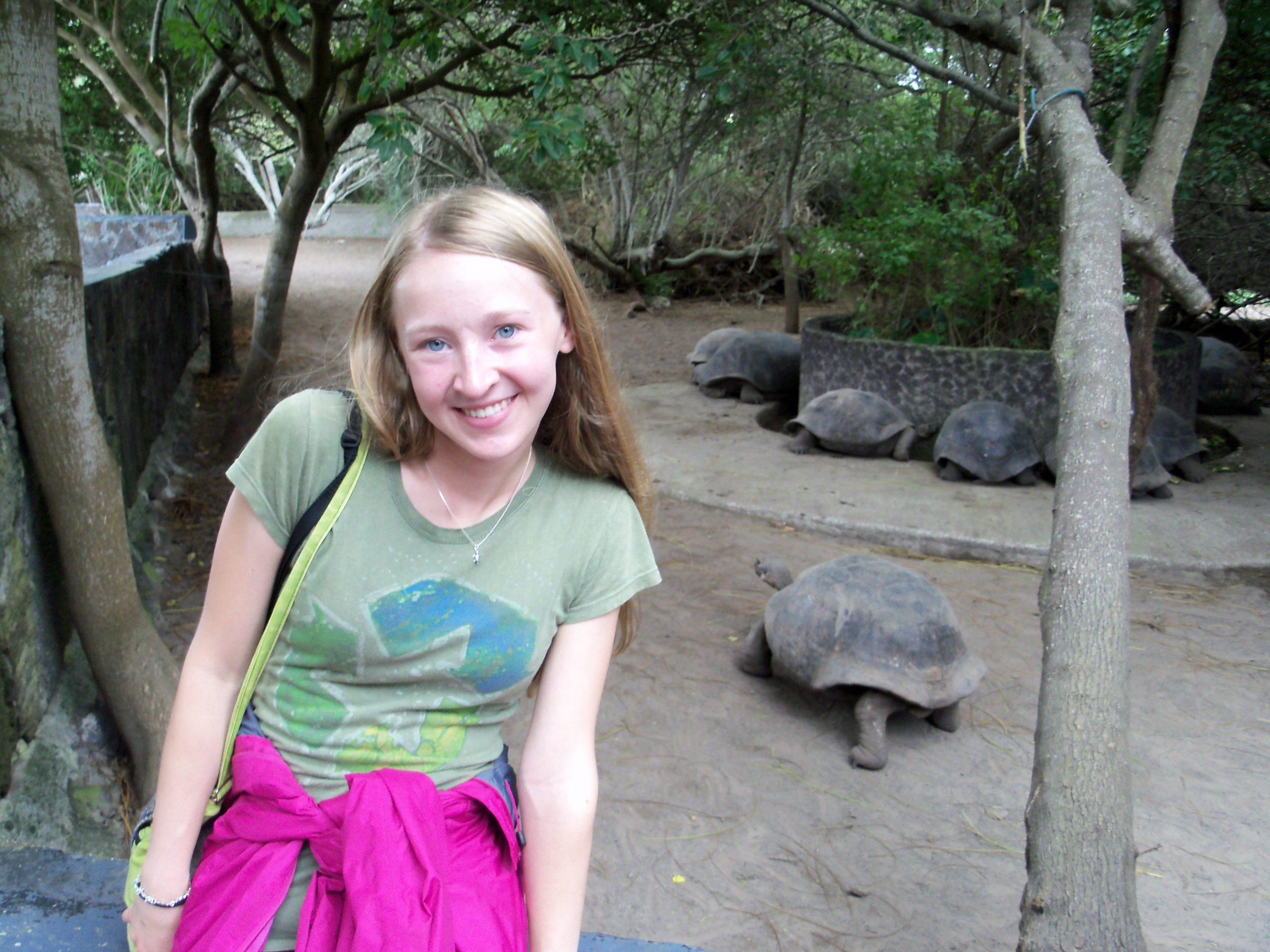
Stephanie Tolar: North Carolina Envirothon
Stephanie Tolar is the Education Specialist for the NCF-Envirothon. Her experience with Envirothon began on a North Carolina middle school Envirothon team and set her on the path to today. (click here to read more)
What inspired you to participate in the Envirothon program?
From a young age, I was always curious and excited about nature. Envirothon helped me to develop that interest into a passion for ecology. I followed this passion throughout my undergraduate and graduate studies, and eventually, this passion became my career.
I was involved in the Envirothon program throughout middle school and high school. I competed with my team at the international level twice, representing the state of North Carolina. During these years, I spent countless hours poring over study materials, quizzing my teammates, getting my hands dirty in a soil pit, debating eye socket placement on animal skulls, tromping through streams to find macroinvertebrates, and measuring basal area in my local forests. I was steeped in both the theoretical and practical knowledge of the natural world. I loved all of it. I loved reading about a concept in my Envirothon manual and then seeing it in real life on my next hike in the woods. I was inspired and challenged by the competition, going on to university to do research and study ecology.
When I arrived at university, I discovered that the depth and breadth of my knowledge was much more extensive than that of my classmates. I was able to tie in so many experiences from Envirothon, and it made my undergraduate degree a richly rewarding experience. I also used the scholarship money that I had earned at the international competition to fund a study abroad trip to the Galapagos Islands, where I spent a summer studying marine ecology and local conservation efforts in Ecuador.
I still wanted to learn more. I went on to pursue a Master’s Degree in Biology, specializing in science education and ecology. Envirothon had inspired me to share my love of nature with others, and I became an environmental educator. I have worked in formal and informal teaching settings, both in the classroom and in the field. My journey has come full circle, and I now serve as the NCF-Envirothon Education Specialist.
I was involved in the Envirothon program throughout middle school and high school. I competed with my team at the international level twice, representing the state of North Carolina. During these years, I spent countless hours poring over study materials, quizzing my teammates, getting my hands dirty in a soil pit, debating eye socket placement on animal skulls, tromping through streams to find macroinvertebrates, and measuring basal area in my local forests. I was steeped in both the theoretical and practical knowledge of the natural world. I loved all of it. I loved reading about a concept in my Envirothon manual and then seeing it in real life on my next hike in the woods. I was inspired and challenged by the competition, going on to university to do research and study ecology.
When I arrived at university, I discovered that the depth and breadth of my knowledge was much more extensive than that of my classmates. I was able to tie in so many experiences from Envirothon, and it made my undergraduate degree a richly rewarding experience. I also used the scholarship money that I had earned at the international competition to fund a study abroad trip to the Galapagos Islands, where I spent a summer studying marine ecology and local conservation efforts in Ecuador.
I still wanted to learn more. I went on to pursue a Master’s Degree in Biology, specializing in science education and ecology. Envirothon had inspired me to share my love of nature with others, and I became an environmental educator. I have worked in formal and informal teaching settings, both in the classroom and in the field. My journey has come full circle, and I now serve as the NCF-Envirothon Education Specialist.
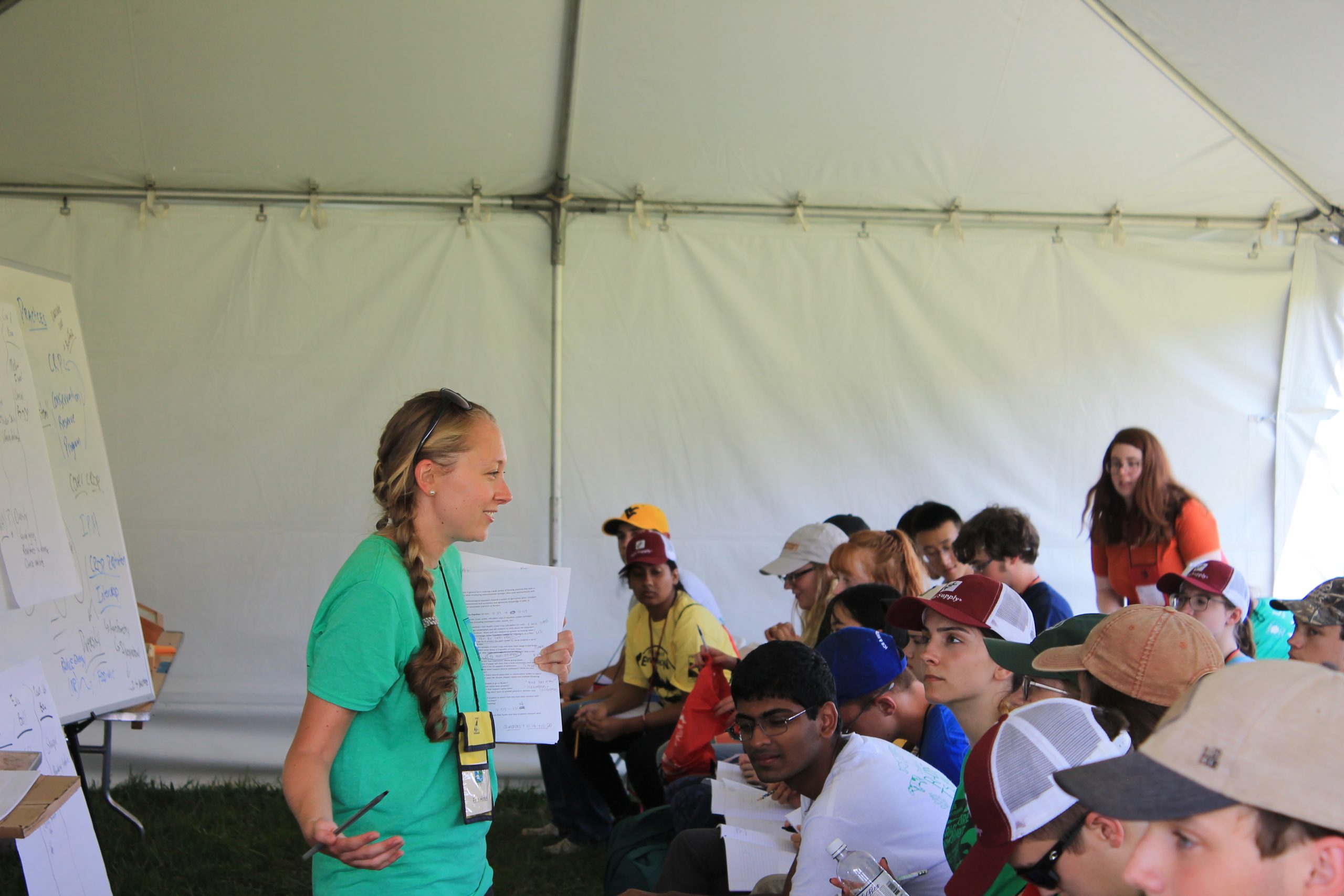
Erin Hines: North Carolina Envirothon
Erin Hines is the Environmental Educator for the Gaston County Soil and Water Conservation District and serves on the NC Envirothon committee. (click here to read more)
Erin Hines grew up in Envirothon, participating throughout middle school and high school in the North Carolina (NC) Envirothon competition (NC holds a middle school Envirothon in addition to the high school program). Her team’s commitment and drive led them to winning the state championship three times, earning them the chance to compete in three NCF-Envirothon international annual competitions. “The scholarship money we earned from the competitions supported us in our educational pursuits beyond high school. Five of us received full scholarships to NC State University, and all but one of us chose natural resource careers including environmental studies, biological and agricultural engineering, soil science, geology, and parks and recreation. All of us have said Envirothon was a major influence in our choices.”
Today, Erin is an Environmental Educator for the Gaston County Soil and Water Conservation District, serves on the NC Envirothon committee and has this to say about the Envirothon, “As a program, Envirothon has what it takes to be extremely effective in influencing adult environmentalism, including extended duration, adult mentors, and time in nature. So here I am, throwing my weight behind this exceptional educational experience, and thanking all who make it possible.”
Today, Erin is an Environmental Educator for the Gaston County Soil and Water Conservation District, serves on the NC Envirothon committee and has this to say about the Envirothon, “As a program, Envirothon has what it takes to be extremely effective in influencing adult environmentalism, including extended duration, adult mentors, and time in nature. So here I am, throwing my weight behind this exceptional educational experience, and thanking all who make it possible.”
Jordan Daigle: Maine Envirothon
Jordan is currently at Harvard University, majoring in Engineering Sciences with a focus on Chemistry. He is interested in how engineering can positively impact the environment. In the future, he wants to work in the field of water purification. (click here to read more)
How did you get involved with Envirothon? I got involved with Envirothon because of my mentor in high school. He had been my teacher in middle school, and he recommended that I get involved with Envirothon. He had always given me great advice, so I joined!
How were your experience with Envirothon? I attended the Maine State competition all four years of high school, and I attended three international competitions: Ontario, Maryland, and Idaho.
How/when did your interest in the environment start? My interest in the environment stems from my family. I would go fishing with my brother, father, and grandfather in some of the most pristine areas of Maine, near Mt. Katahdin. If you are ever lucky enough to visit Northern Maine, you would immediately understand why I became interested in environmental science. I am grateful for where I grew up, and I believe everybody should be able to enjoy nature in its purest form.
Are there any skills that you learned through Envirothon that you currently /continue to use? Absolutely. Of course, there are a lot of technical skills that I use in my classes, but I firmly believe that the skill I use the most is the way that Envirothon trains you to think. The problems in our world today are not one dimensional-- they are complex issues with no clear solution. Therefore, being able to think about creative solutions that are good for the environment, are economically feasible, and are good for society is critical for making any progress in issues such as climate change and water pollution. Being able to view a problem from more than just your point of view is not just helpful in a helpful in an academic sense, but also in the workplace and in society.
What do you think students gain from participating in Envirothon? I believe that if you fully immerse yourself in the Envirothon experience, you will gain problem solving skills, communication skills, presentation skills, a deep appreciation for the environment, and make connections with leaders in conservation.
Do you think Envirothon is a valuable program? Why? Of course! It will take you places that you would never go, it allows you to meet extremely intelligent and passionate people, and it teaches you about the natural world, business, much more. In fact, it was so valuable to me that I wrote about Envirothon in my college application essay.
All in all, did you enjoy your Envirothon experience? Yes! In high school, Envirothon was the most fulfilling extracurricular that I participated in. I love that Envirothon is a team activity, as you become very close with your teammates. The people are just one of the reasons that Envirothon is fun, but there are plenty of other reasons such as the swap meet and the field trip day.
How were your experience with Envirothon? I attended the Maine State competition all four years of high school, and I attended three international competitions: Ontario, Maryland, and Idaho.
How/when did your interest in the environment start? My interest in the environment stems from my family. I would go fishing with my brother, father, and grandfather in some of the most pristine areas of Maine, near Mt. Katahdin. If you are ever lucky enough to visit Northern Maine, you would immediately understand why I became interested in environmental science. I am grateful for where I grew up, and I believe everybody should be able to enjoy nature in its purest form.
Are there any skills that you learned through Envirothon that you currently /continue to use? Absolutely. Of course, there are a lot of technical skills that I use in my classes, but I firmly believe that the skill I use the most is the way that Envirothon trains you to think. The problems in our world today are not one dimensional-- they are complex issues with no clear solution. Therefore, being able to think about creative solutions that are good for the environment, are economically feasible, and are good for society is critical for making any progress in issues such as climate change and water pollution. Being able to view a problem from more than just your point of view is not just helpful in a helpful in an academic sense, but also in the workplace and in society.
What do you think students gain from participating in Envirothon? I believe that if you fully immerse yourself in the Envirothon experience, you will gain problem solving skills, communication skills, presentation skills, a deep appreciation for the environment, and make connections with leaders in conservation.
Do you think Envirothon is a valuable program? Why? Of course! It will take you places that you would never go, it allows you to meet extremely intelligent and passionate people, and it teaches you about the natural world, business, much more. In fact, it was so valuable to me that I wrote about Envirothon in my college application essay.
All in all, did you enjoy your Envirothon experience? Yes! In high school, Envirothon was the most fulfilling extracurricular that I participated in. I love that Envirothon is a team activity, as you become very close with your teammates. The people are just one of the reasons that Envirothon is fun, but there are plenty of other reasons such as the swap meet and the field trip day.
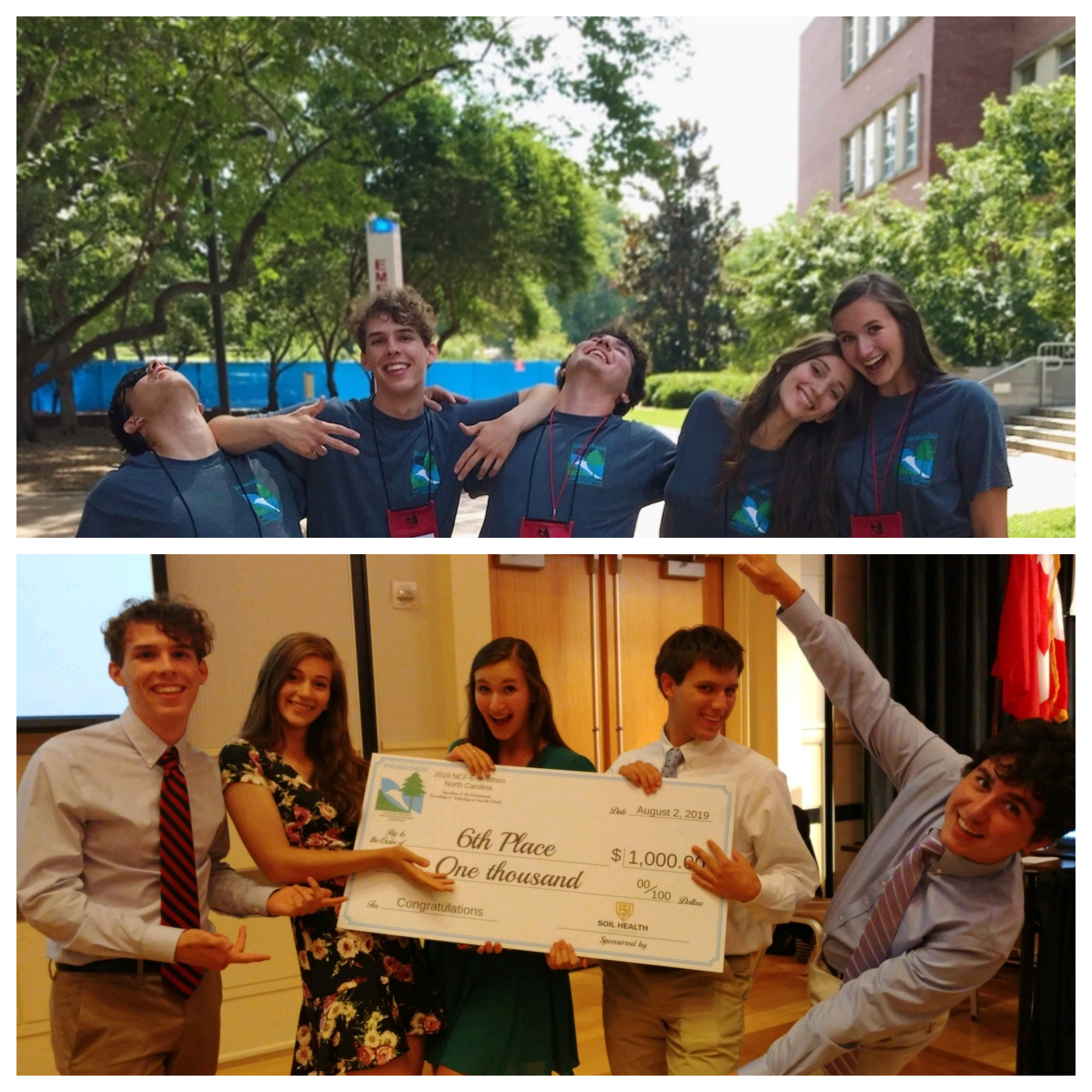
Isabella Goodchild-Michelman: South Carolina Envirothon
Isabella is currently studying Molecular and Cellular biology at Harvard University with the eventual goal of becoming a biological engineer. (click here to read more)
How were your experiences with Envirothon? I have been to 3 South Carolina State Competitions and 2 International competitions (Idaho and North Carolina)
How/when did your interest in the environment start? My grandma has always been very passionate about environmental protection and so starting from when I was very little she ensured I had an appreciation for the environment and an understanding that it needs to be protected.
How did you get involved with Envirothon? My chemistry teacher Mr. Wilder (who went on to also be my AP Chemistry and AP Environmental Science teacher) invited me to join our school’s team in the 10th grade.
Are there any skills that you learned through Envirothon that you currently /continue to use? Envirothon has taught me so many things! From very concrete skills like conducting a soil survey or being able to identify 40+ tree species to more general skills such as leadership, teamwork and presentation ability, I have learned so much over my three years of envirothon and I know I will use many of the skills I learned as I continue into college and the workforce.
What do you think students gain from participating in Envirothon? By participating in Envirothon students will gain a much deeper understanding of our natural world than they could solely from the classroom. The presentation component of the competition will give students valuable research, teamwork and presentation experience. Additionally, Envirothon exposes students to a variety of careers involving environmental protection and allows them to engage with professionals from these fields.
Do you think Envirothon is a valuable program? Why? Climate Change is increasingly becoming a threat to the welfare and happiness of people around the globe and our generation is the one that needs to come up with answers to fix it. Increasing awareness of environmental issues in students is one of the most important ways we can begin to address climate change and Envirothon is a program that does just that; by getting students excited about protecting the environment, Envirothon is helping to create a brighter future.
All in all, did you enjoy your Envirothon experience? Envirothon was one of (if not the most) meaningful extracurricular I did in high school. I would not be the student (and future scientist) I am today without it.
How/when did your interest in the environment start? My grandma has always been very passionate about environmental protection and so starting from when I was very little she ensured I had an appreciation for the environment and an understanding that it needs to be protected.
How did you get involved with Envirothon? My chemistry teacher Mr. Wilder (who went on to also be my AP Chemistry and AP Environmental Science teacher) invited me to join our school’s team in the 10th grade.
Are there any skills that you learned through Envirothon that you currently /continue to use? Envirothon has taught me so many things! From very concrete skills like conducting a soil survey or being able to identify 40+ tree species to more general skills such as leadership, teamwork and presentation ability, I have learned so much over my three years of envirothon and I know I will use many of the skills I learned as I continue into college and the workforce.
What do you think students gain from participating in Envirothon? By participating in Envirothon students will gain a much deeper understanding of our natural world than they could solely from the classroom. The presentation component of the competition will give students valuable research, teamwork and presentation experience. Additionally, Envirothon exposes students to a variety of careers involving environmental protection and allows them to engage with professionals from these fields.
Do you think Envirothon is a valuable program? Why? Climate Change is increasingly becoming a threat to the welfare and happiness of people around the globe and our generation is the one that needs to come up with answers to fix it. Increasing awareness of environmental issues in students is one of the most important ways we can begin to address climate change and Envirothon is a program that does just that; by getting students excited about protecting the environment, Envirothon is helping to create a brighter future.
All in all, did you enjoy your Envirothon experience? Envirothon was one of (if not the most) meaningful extracurricular I did in high school. I would not be the student (and future scientist) I am today without it.
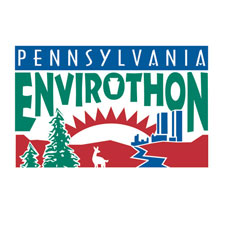
Ryan Ling: Pennsylvania Envirothon
Ryan Ling is a District Forester with the Dept. of Conservation and Natural Resources (DCNR). (click here to read more)
When people ask me why I chose a career in forestry, I always answer without hesitation the same two reasons, “Scouting and the Envirothon.” Like most rural Pennsylvania kids, I spent most of my time as a youth with my brother and friends fishing, playing sports, participating in scouting, climbing trees and doing all the things little boys do while exploring the great outdoors. As I entered high school I still spent much of my free time outdoors playing sports, hunting and fishing. So when some of my friends floated the idea of having an Envirothon team at West Branch Area High School, I was absolutely on board. I didn’t know at that time what an Envirothon was, but anything that was outdoors and a competition was something I could get behind. So we studied and prepared our team; The Environ-Mentals, for the Clearfield County Envirothon.
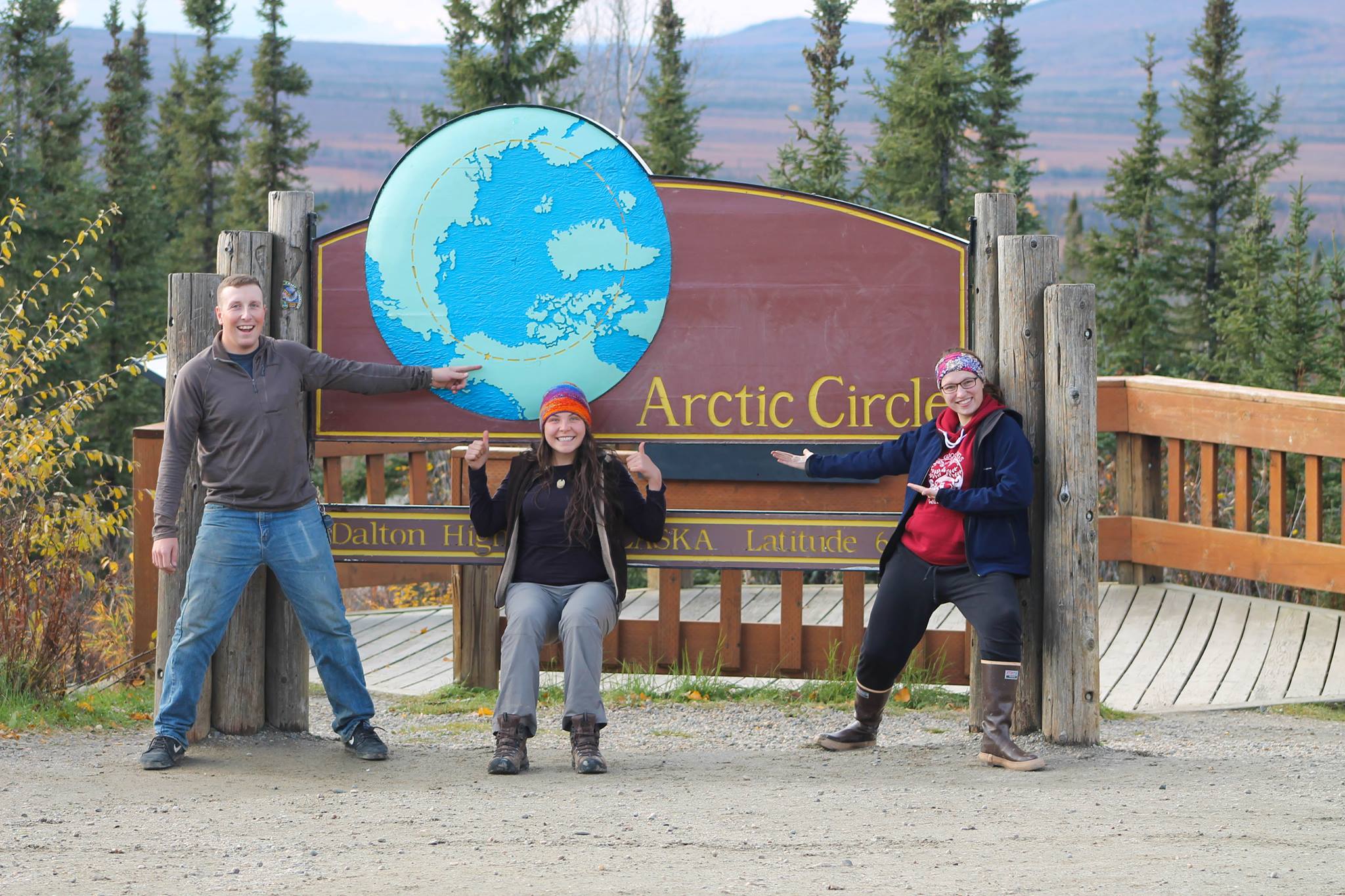
2012 Envirothon alumni meet up
2012 Envirothon alumni (members of the Alaska Envirothon and Newfoundland & Labrador Envirothon teams) reconnect . (click here to read more)
From Michaela Pye (Newfoundland & Labrador Envirothon team member): " I’m doing an exchange year at University of Alaska Fairbanks, where Hannah is doing her degree and Lachlan just so happened to be stationed in Fairbanks with the military!
We thought it was a pretty neat thing. We all met at Envirothon in Montana (2012) and joked about visiting each other one day, I guess the time has come! Envirothon has facilitated so many lifetime friendships- it's pretty special! "
We thought it was a pretty neat thing. We all met at Envirothon in Montana (2012) and joked about visiting each other one day, I guess the time has come! Envirothon has facilitated so many lifetime friendships- it's pretty special! "

Whitney Gould: Nova Scotia Envirothon
Whitney Gould, We'Koqma'q First Nations, Nova Scotia, Canada. (click here to read more)
Envirothon has helped me in many ways in high school life. First, it has helped me conquer my fear of being in front of a crowd and helped me develop my self esteem. Envirothon heled me understand other things in my classes, also gave me a better understanding of TEAMWORK.

